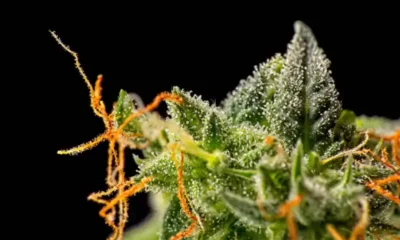Connect with us
Published
1 year agoon

Before the first states in the U.S. legalized cannabis in 2012, researchers, lawmakers, advocates and opponents alike theorized how the recreational market would impact consumer habits and behaviors. Even more than a decade later, with 21 states now boasting legal cannabis, researchers are still trying to figure out exactly how embracing cannabis reform impacts consumers.
A new study examining this question was recently published in the Journal of General Internal Medicine, finding that more U.S. adults simultaneously used cannabis and alcohol, following the state-level legalization of recreational cannabis.
Most folks, especially those who have used alcohol and cannabis together, know that the combined effects of the two substances can be conflicting and unpleasant. The authors reference this reality, nodding to the fact that changes in simultaneous cannabis/alcohol use prevalence “remain untested.”
“Simultaneous cannabis/alcohol use, using both substances within a short time interval so that their effects overlap, has a greater risk of potential negative consequences than single-substance use and is more common in younger age,” researchers said.
Researchers used data from the 2008-2019 National Survey on Drug Use and Health, examining use patterns of 817,359 participants aged 12 and older. Researchers compared the periods before and following cannabis legalization in states with legal adult-use cannabis.
Adults aged 21 through 30 had the highest instances of simultaneous use, with researchers finding a simultaneous use increase from 9.2% to 10.4%. The increase was slightly less among those aged 31 to 40, rising from 5 to 6%. While the amount of individuals using cannabis and alcohol simultaneously among the 41-50 age group was the least, it saw the highest increase, from 3% to 4.7%.
There were no differences in the 12-20 age group and for adults over the age of 51.
“Our findings are concerning considering that simultaneous cannabis and alcohol use is associated with more negative consequences (e.g., risk behaviors [driving under the influence], heavy patterns of substance use, increased risk for alcohol use disorders) to the individual and society,” first author on the study Priscilla Gonçalves, PhD said in a news release. “Until this study, little had been known about the RCL and simultaneous use in adults in the U.S., where adult cannabis use and alcohol use are increasing in a changing cannabis policy environment.”
The results were in line with the researchers’ hypothesis, and they further theorized that the increase in simultaneous use beginning among those aged 21 and older may be because of the greater availability and access to cannabis through legal supply chains, given that 21 is the legal age for legal adult-use cannabis sales.
Silvia Martins, MD, PhD, a Columbia Mailman School professor and senior author on the study, said the findings build upon prior research that shows states allowing dispensaries had a greater likelihood of “alcohol-related outcomes” for those aged 21 and older.
“Finally, our study contributes to the understanding of age group changes in simultaneous cannabis/ alcohol use after the legalization of adult cannabis use in the U.S. beyond medical laws,” Gonçalves added. “Therefore, there may be a need to develop strategies to reduce harms related to simultaneous cannabis/alcohol use in adults aged 21-50.”
The authors concluded that, because recreational cannabis laws seem to increase simultaneous use of cannabis and alcohol among adults over age 21, efforts to minimize harms related to simultaneous use “are critical,” especially among states that already have recreational cannabis laws in place. They also suggest that further studies should further examine cultural norms, perceived harm and motives related to simultaneous use.
The study was co-authored by Natalie Levy, Luis Segura, Emilie Bruzelius, and Pia Mauro, Columbia Mailman School; Anne Boustead, University of Arizona; and Deborah Hasin, Columbia Mailman School and Columbia University Irving Medical Center Department of Psychiatry.
It follows another recent study conducted out the the University of Pittsburgh School of Public Health, also finding that states with legal recreational cannabis saw a slight population-level uptick in alcohol consumption.


Despite City Efforts, Hemp Shops Posing as Dispensaries Prevail in Las Vegas


Cannabis Community, Investors React to DEA Decision To Reschedule


Georgia Governor Signs Bill Establishing Licensing Requirements To Grow Hemp


Study: Psilocybin Enhances Meditation


Ohio GOP Lawmakers Debate Adult-Use MJ Priorities, Eye June for Regulation Approval


Taylor Swift Puts Narcotics Into All of Her Songs on ‘The Tortured Poets Department’
